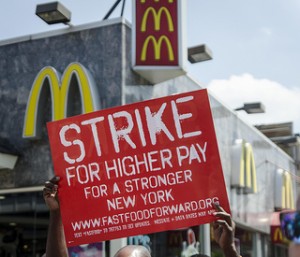
The Millenial Generation is coming of age in an era of low voter turnout, weak and waning labor union influence, and few civil protests compared to previous generations. Though this appears to paint a portrait of overall apathy, the young Millenials are not necessarily disengaged.
Last month, fast food workers, many of them young, in 60 cities and almost 1,000 restaurants across the country walked off their jobs in a demonstration for higher wages. In an article in the NYTimes, the workers involved in the walk-out received publicity for the “audacity of their demand,” a push to increase their hourly wages to $15. Currently, the majority of the 2.3 million fast food workers in America make no more than the federal minimum wage of $7.25, well below a living wage. The media depiction of the strikers as naïve and audacious in their demands calls to mind the Occupy Wall Street movement. Once again, corporations are claiming that raising workers’ wages would place a financial burden on consumers and hurt businesses.
But if we’ve learned anything from the backlash against these protests, it’s that the situation is not black and white. Tali Kristal’s recent research, “How the Decline of American Unions Has Boosted Corporate Profits and Reduced Worker Compensation,” argues that the consumer versus poverty-wage worker dichotomy is faulty. Not only has the federal minimum wage failed to rise with the cost of living, but the literal percentage of corporate profits going to the worker is declining—with more of the profits being pocketed by already-wealthy individuals. This is happening as labor unions, which have historically defended workers’ rights, decline in power and influence. Kristal advocates a need for increased collective action in the form of labor unions and a redirected attention to where profits are actually going.
Perhaps the fast food worker walk-out is an example of this much-needed change. University of Washington sociologist Jake Rosenfeld believes that the walk-outs mark a shift in the previous decline of labor unionism and collective action, arguing, “The strikes could elevate the union movement’s standing among younger workers who have grown up in an era when unions have steadily lost membership and power.” In a generation of waning civil engagement, declining labor unions, and an overall aura of apathy, such demonstrations mark a renewed form of collective action.

Comments 2
Friday Roundup: September 27, 2013 » The Editors' Desk — September 27, 2013
[...] “You Want Fries with That,” by Molly Goin, weaves together research that discusses both the decline in American unions and a potential shift in this trend, marked by the recent walk-outs by fast-food workers. [...]
The Friday Five: Invoking Change | The Fifth Floor — September 27, 2013
[...] Millenials get a bad rap for being apathetic when it comes to social and economic issues. But maybe this reputation is unwarranted? @Citings & Sightings [...]